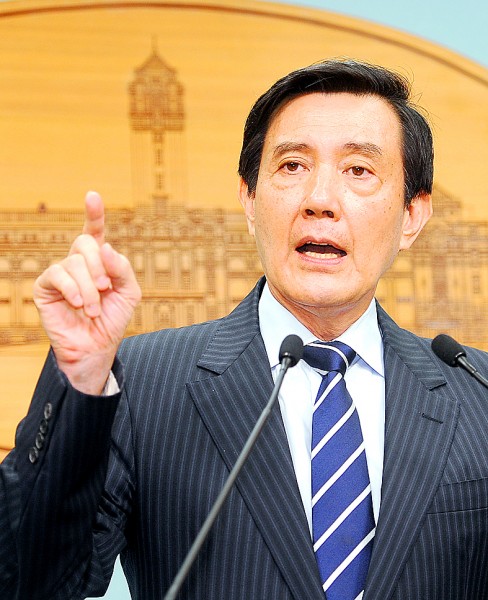《TAIPEI TIMES 焦點》Ma calls for end to cross-party enmity

President Ma Ying-jeou speaks at a press conference at the Presidential Office Building in Taipei yesterday. Photo: Fang Pin-chao, Taipei Times
UNITY PLEA: Alongside his call for political parties to reconcile, Ma called on the public to back his trade policies, citing a ‘WSJ’ piece as proof of their soundness
By Shih Hsiu-chuan / Staff reporter
President Ma Ying-jeou (馬英九) yesterday called for end to “vicious political infighting” among the nation’s politicians, while repeatedly praising the views expressed in a Wall Street Journal editorial last week titled: “Taiwan Leaves Itself Behind” and urging legislators to speedily ratify the cross-strait service trade agreement.
“Once again I appeal to the minority opposition parties to stop using violent means like occupying the legislative floor to bully the majority and paralyze legislative proceedings. [If their boycott continues,] what alternatives are there to deal with issues vital to the nation’s economic development?” Ma said.
No one will emerge victorious from vicious political infighting at the expense of the nation’s interests, Ma said, adding: “We have to unite under the accord to keep our nation moving forward because Taiwan is the only homeland we have and moving forward is our only choice. There is no turning back — we must march on bravely.”
Ma made the remarks at a press conference that the Presidential Office said had been called so the president could deliver an “important speech” on the gas pipeline explosions that devastated Greater Kaohsiung on July 31 and Aug. 1.
However, after dedicating the first three minutes of a nine-minute speech to detailing what the central government has done to assist the Greater Kaohsiung Government in rescue and relief operations, Ma quickly moved from the blasts that killed 30 people and injured 310 to “the future of Taiwan’s economy.”
“After the rescue operations come to an end, there are three things we need to do in the future: rebuild our homeland, determine what the causes of the explosion were and prevent the recurrence of such incidents,” Ma said, pledging that the central government would continue providing assistance to the city government.
He then turned to the subject of the nation’s economy, starting with the Journal editorial from Aug. 4.
“The editorial’s critique of the aura of isolation Taiwan has imposed on itself has resonated with many people,” he said, adding that the article delivered three home truths.
The first is that Taiwan will “only hurt itself” if it preserves national barriers to cross-strait trade. Second, as South Korea and China step up negotiations aimed at signing a free-trade agreement by the end of the year, the success of those talks could “be a serious problem for Taiwan,” whose exports to China overlap significantly with those of South Korea, Ma said.
The third point is that the legislature should ratify the service trade agreement stymied by the student-led Sunflower movement as soon as possible, while also passing the trade in goods agreement being negotiated with Beijing once those talks have concluded, Ma said, warning that if lawmakers do not do this, “Taiwan will be further isolated.”
The editorial echoed many of the views that the government has espoused over the past year, and which have seen it criticized by “some people who are of the opinion that the government is just exaggerating things to scare people,” the president said.
“Now, the international media is expressing the same views as us [the government],” Ma said. “We must continue to push for trade liberalization to avoid being marginalized... To that end, further cross-strait cooperation in trade and economics is inevitable.”
The president said he drew on the Journal editorial to strengthen his arguments not because he is obsequious to whatever foreigners say, but with the purpose of letting “everyone know that the international community is looking at Taiwan and, in their eyes, it is very regrettable that Taiwan is falling behind other countries in opening up its economy and that vicious political infighting has dragged down its major economic policy agenda.”
In response to media inquires on what steps can be taken to end the political squabbling, Ma said he does not — and has never — rule out sitting down with Democratic Progressive Party chairperson Tsai Ing-wen (蔡英文), but that ideally, he would start the reconciliation process by building a consensus within the Chinese Nationalist Party (KMT) that he chairs before reaching out to the opposition.
新聞來源:TAIPEI TIMES


















